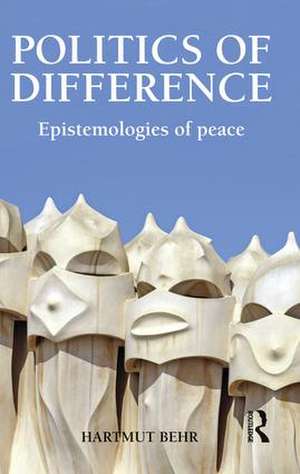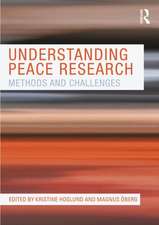Politics of Difference: Epistemologies of Peace: Global Horizons
Autor Hartmut Behren Limba Engleză Paperback – 26 aug 2015
In doing so, it relates to the phenomenological discourse of the twentieth century, especially to Georg Simmel, Alfred Schütz, Emmanual Lévinas, and Jacques Derrida, and drafts our understanding of difference as a genuine human experience of a social and political world that is in motion and transformative, rather than static and predictable. On this basis of temporalized ontology and its normative consequences, differences are drafted as a positive social and political force and as powerful capacities of transformation and change. In practical terms, this understanding is most important for our theorizing and acting upon peace, peace-building, and conflict solution. Differences now appear not as obstacle to peace and reconciliation, but as lively and constructive articulations of 'otherness' and as a positive power of transformation, emancipation, and change.
This book will be of interest to students of international relations, philosophy and political theory.
| Toate formatele și edițiile | Preț | Express |
|---|---|---|
| Paperback (1) | 407.19 lei 6-8 săpt. | |
| Taylor & Francis – 26 aug 2015 | 407.19 lei 6-8 săpt. | |
| Hardback (1) | 1051.55 lei 6-8 săpt. | |
| Taylor & Francis – 30 apr 2014 | 1051.55 lei 6-8 săpt. |
Preț: 407.19 lei
Nou
Puncte Express: 611
Preț estimativ în valută:
77.92€ • 81.25$ • 64.76£
77.92€ • 81.25$ • 64.76£
Carte tipărită la comandă
Livrare economică 21 martie-04 aprilie
Preluare comenzi: 021 569.72.76
Specificații
ISBN-13: 9781138933873
ISBN-10: 1138933872
Pagini: 202
Dimensiuni: 138 x 216 x 11 mm
Greutate: 0.24 kg
Ediția:1
Editura: Taylor & Francis
Colecția Routledge
Seria Global Horizons
Locul publicării:Oxford, United Kingdom
ISBN-10: 1138933872
Pagini: 202
Dimensiuni: 138 x 216 x 11 mm
Greutate: 0.24 kg
Ediția:1
Editura: Taylor & Francis
Colecția Routledge
Seria Global Horizons
Locul publicării:Oxford, United Kingdom
Public țintă
Postgraduate and UndergraduateCuprins
Preface; Acknowledgements; Glossary; Introduction; 1 In Defence of Ontology, 1.1 Introduction, 1.2 From relativism to relationism: on reading and normativity, 1.3 Ontology is not (necessarily) essentialism: on temporality; 2 The Problem of "Otherness" and Modes of Temporality, 2.1 Introduction, 2.2 Western ontologies and the construction of "otherness", 2.3 Searching for thinking difference beyond; 3 Phenomenologies of "Otherness", 3.1 Introduction, 3.2 Being-in-time, transformativity, and sociability; 3.3 ‘Crisis’/’trauma’, the question of beginning, and the permanence of critical exegesis; 4 From E Pluribus unum to Fatemini Pluribus Pluribum, 4.1 Introduction, 4.2 Non-silence and the embrace of differences, 4.3 Western narratives of ‘peace’: a critique, 4.4 Peace as living towards differences; Conclusions: Conditions of the Possibility of Peace; Bibliography; Index
Recenzii
"Difference has become a significant concern of the study of international politics and also in peace and conflict studies. Yet, approaches to understanding or incorporating issues of difference into the analysis of international order have often tended to come to rest on essentialising notions of ethnicity or other forms of identity, which also are relegated to a state of lesser importance than westernised notions of secular citizenship, cosmopolitan toleration, and free-flowing capital. This important book engages with the difficult and necessary task of envisioning peace-with-difference in international politics. Without advances in this area, as Professor Behr outlines, difference is destined to undermine order when instead it might be constitutive of peace."
Prof. Oliver Richmond, University of Manchester, UK
"Hartmut Behr makes a significant contribution to our understanding of the fundamental problems centering around our conventional concept of peace. With the help of phenomenological, anti-essentialist thinkers, he reveals that the concept of peace, as deployed in the Western tradition of political and philosophical thought as well as in international politics, is a hegemonic and imperial concept that suppresses and assimilates difference, thus effacing otherness for the sake of the self. He eloquently invites us on a thrilling but serious journey towards reconceptualizing a non-hegemonic peace that is hospitable to difference."
Takashi Kibe, Professor of Political Theory and Director of the Peace Research Institute, International Christian University, Tokyo, Japan
"Philosophically grounded, Politics of Difference not only produces one of the most compelling critiques of 'imperial peace' and its genealogies, but offers with sustained intellectual vigour an original discourse on the ontology of our times. It is truly a tour de force."
Mustapha Kamal Pasha, Chair in International Politics, Aberystwyth University, UK
Prof. Oliver Richmond, University of Manchester, UK
"Hartmut Behr makes a significant contribution to our understanding of the fundamental problems centering around our conventional concept of peace. With the help of phenomenological, anti-essentialist thinkers, he reveals that the concept of peace, as deployed in the Western tradition of political and philosophical thought as well as in international politics, is a hegemonic and imperial concept that suppresses and assimilates difference, thus effacing otherness for the sake of the self. He eloquently invites us on a thrilling but serious journey towards reconceptualizing a non-hegemonic peace that is hospitable to difference."
Takashi Kibe, Professor of Political Theory and Director of the Peace Research Institute, International Christian University, Tokyo, Japan
"Philosophically grounded, Politics of Difference not only produces one of the most compelling critiques of 'imperial peace' and its genealogies, but offers with sustained intellectual vigour an original discourse on the ontology of our times. It is truly a tour de force."
Mustapha Kamal Pasha, Chair in International Politics, Aberystwyth University, UK
Descriere
This book attempts to approach peace from its theoretical fundations, developing a framework that, first, will address critiques of concepts of peace, which nullify this fundamental relation and are therefore called ‘imperial peace’ here (also ‘liberal peace’ elsewhere); and second, for (re)thinking of peace as a tension between ‘self’ and "other" anchored in a politics of the promotion and cultivation of differences. This framework thus operates as both a critique and a re-articulation of peace.






























